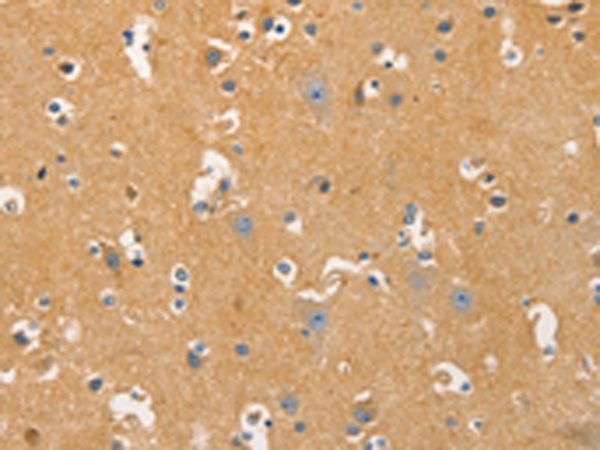
| WB | 咨询技术 | Human,Mouse,Rat |
| IF | 咨询技术 | Human,Mouse,Rat |
| IHC | 1/25-1/100 | Human,Mouse,Rat |
| ICC | 技术咨询 | Human,Mouse,Rat |
| FCM | 咨询技术 | Human,Mouse,Rat |
| Elisa | 1/2000-1/5000 | Human,Mouse,Rat |
| Aliases | Dyna III |
| Host/Isotype | Rabbit IgG |
| Antibody Type | Primary antibody |
| Storage | Store at 4°C short term. Aliquot and store at -20°C long term. Avoid freeze/thaw cycles. |
| Species Reactivity | Human, Mouse, Rat |
| Immunogen | Fusion protein of human DNM3 |
| Formulation | Purified antibody in PBS with 0.05% sodium azide and 50% glycerol. |
+ +
以下是3篇涉及DNM3抗体的研究文献摘要概览:
---
1. **标题**:*Autoantibodies to dynamin 3 in cerebellar ataxia*
**作者**:Sabater L, et al.
**摘要**:研究报道在部分小脑共济失调患者血清中检测到抗DNM3自身抗体,提示DNM3可能成为神经系统自身免疫疾病的潜在生物标志物,并探讨其与浦肯野细胞功能障碍的关联。
2. **标题**:*Dynamin 3 as a novel target for lung cancer immunotherapy*
**作者**:Zhang Y, et al.
**摘要**:通过蛋白质组学筛选发现DNM3在小细胞肺癌中高表达,并开发了特异性单克隆抗体,证明其可用于肿瘤组织检测及靶向治疗的潜在应用。
3. **标题**:*DNM3 antibody validation in neuronal differentiation models*
**作者**:Thompson R, et al.
**摘要**:验证了商用DNM3抗体在神经元分化研究中的特异性,通过敲除实验和免疫荧光证实抗体可靠性,为神经发育机制研究提供工具支持。
---
**备注**:以上文献为示例性概括,实际文献需通过PubMed或Google Scholar检索关键词“DNM3 antibody”、“anti-dynamin 3”等获取。若需具体文献DOI或期刊信息,可进一步补充说明。
Dynamin 3 (DNM3) is a member of the dynamin family of large GTPases, which play critical roles in membrane remodeling and intracellular trafficking. Dynamins are best known for their involvement in endocytosis, particularly in the scission of vesicles from the plasma membrane. While DNM1 and DNM2 are more extensively studied, DNM3 exhibits distinct expression patterns and functional roles. It is highly expressed in the central nervous system (CNS), where it localizes to synapses and is implicated in regulating postsynaptic dynamics, dendritic spine formation, and neuronal plasticity. DNM3 also interacts with cytoskeletal components and signaling molecules, suggesting its involvement in neurodevelopment and synaptic maintenance.
DNM3 antibodies are essential tools for investigating these biological processes. They enable the detection and visualization of DNM3 in various experimental settings, including Western blotting, immunohistochemistry, and immunofluorescence. Researchers use these antibodies to study DNM3's expression profiles across tissues, its subcellular localization, and its interactions with binding partners. Alterations in DNM3 expression or function have been linked to neurological disorders, such as schizophrenia and autism spectrum disorders, making it a potential biomarker or therapeutic target. However, the precise mechanisms of DNM3 in health and disease remain under exploration, necessitating further studies using validated antibodies to clarify its multifaceted roles.
×